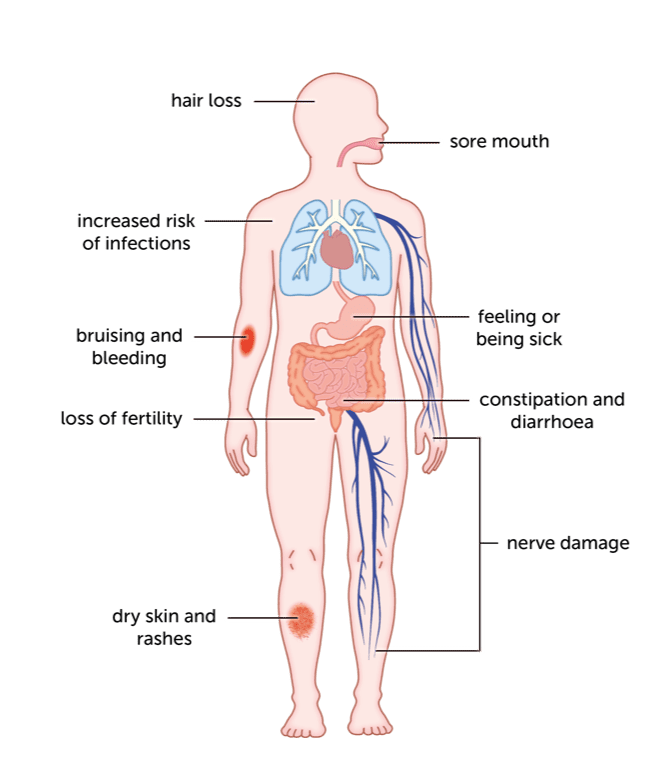

Fagonia Cretica Extract has been extremely beneficial in reducing the side-effects of chemotherapy, besides strengthening the Normal Cells
Chemotherapy, a cornerstone in cancer treatment, introduces a range of physiological side effects as it targets rapidly dividing cells, impacting both cancerous and healthy tissues. Understanding these side effects and their relevance is crucial for comprehensive patient care.
Here are 20 such serious side effects of chemotherapy explained with regards to their relevance on human physiology:
Hair Loss (Alopecia):
Relevance: Hair follicles are among the fastest-dividing cells. Hair loss can affect self-esteem, body image, and emotional well-being, underscoring the importance of supportive care and counseling for patients.Nausea and Vomiting:
Relevance: Chemotherapy triggers the vomiting center in the brain. Controlling nausea enhances patient comfort, ensures adequate nutrition, and improves adherence to treatment.Fatigue:
Relevance: Chemotherapy-induced fatigue results from cellular damage and impacts daily functioning. Addressing fatigue through rest and symptom management is crucial for maintaining quality of life.Anemia:
Relevance: Suppression of bone marrow leads to decreased red blood cell production. Anemia affects oxygen delivery to tissues, exacerbating fatigue and reducing the body’s ability to cope with stress.Immunosuppression:
Relevance: Weakened immune defenses increase susceptibility to infections. Infections can compromise treatment schedules and pose severe health risks, necessitating vigilant monitoring and supportive care.Mucositis:
Relevance: Inflammation of mucous membranes impacts nutrition and oral hygiene. Preventing and managing mucositis is crucial for maintaining oral health, nutritional status, and overall well-being.Neuropathy:
Relevance: Peripheral neuropathy affects sensory and motor nerves, impacting daily activities. Monitoring and managing neuropathy is essential for maintaining functionality and preventing long-term nerve damage.Cognitive Changes (Chemobrain):
Relevance: Cognitive changes can affect daily functioning, work, and quality of life. Recognizing and addressing chemobrain symptoms contribute to improved patient outcomes and mental well-being.Changes in Taste and Smell:
Relevance: Altered taste and smell contribute to poor appetite and malnutrition. Dietary counseling and supportive measures help maintain nutritional intake during treatment.Gastrointestinal Distress:
Relevance: Gastrointestinal issues impact quality of life and may lead to treatment interruptions. Managing symptoms ensures better adherence to treatment and minimizes treatment-related stress.Fluid Retention and Weight Gain:
Relevance: Fluid retention can cause discomfort and affect mobility. Monitoring and managing fluid balance are crucial for patient comfort and overall well-being.Skin Changes:
Relevance: Skin problems impact self-esteem and may lead to infections. Supportive skin care measures help maintain skin integrity and prevent complications.Cardiotoxicity:
Relevance: Cardiotoxic effects can lead to long-term heart issues. Cardiac monitoring is critical for timely intervention and prevention of serious cardiovascular complications.Reproductive Issues:
Relevance: Chemotherapy-induced fertility issues impact family planning and emotional well-being. Discussing fertility preservation options is essential to empower patients to make informed decisions.Psychological Effects:
Relevance: Emotional and psychological impact affects treatment adherence and overall coping. Integrating mental health support improves patient resilience and enhances the overall cancer care experience.Pulmonary Effects:
Relevance: Some chemotherapy drugs may cause lung damage. Monitoring respiratory function is crucial to detect and manage potential complications promptly.Liver Dysfunction:
Relevance: Hepatotoxicity can impact drug metabolism and compromise overall liver function. Regular liver function tests are essential for early detection and management.Renal Impairment:
Relevance: Certain chemotherapy agents can affect kidney function. Regular monitoring ensures prompt intervention to prevent irreversible damage.Endocrine Disruption:
Relevance: Hormonal changes can lead to metabolic disturbances and impact overall well-being. Managing endocrine-related side effects supports metabolic health during treatment.Bone Marrow Suppression:
Relevance: Chemotherapy-induced bone marrow suppression affects blood cell production. Regular blood tests guide interventions to prevent complications such as infections and bleeding disorders.
Understanding and addressing these side effects holistically are essential components of cancer care. Tailoring supportive measures to each patient’s needs ensures not only the efficacy of cancer treatment but also an enhanced quality of life throughout the therapeutic journey.
Fagonia cretica, also known as Dhamasa, is a medicinal plant with potential benefits that helps immensely in managing side effects of chemotherapy.
Here are important medicinal properties of Fagonia cretica explaining how the constituents of Fagonia cretica contributes immensely to managing side effects of chemotherapy:
Anti-Inflammatory Properties:
- Fagonia cretica is known for its anti-inflammatory properties, which can help alleviate inflammation often associated with chemotherapy.
Antioxidant Action:
- The plant contains antioxidants that neutralize free radicals generated during chemotherapy, reducing oxidative stress on the body.
Immunomodulatory Effects:
- Fagonia cretica has demonstrated immunomodulatory effects, potentially aiding in supporting and modulating the immune system compromised by chemotherapy.
Anti-Nausea Potential:
- Some compounds in Fagonia cretica have anti-nausea properties, providing relief to individuals experiencing chemotherapy-induced nausea.
Analgesic Effects:
- Fagonia cretica has been traditionally used for its analgesic properties, which help manage pain and discomfort associated with chemotherapy.
Detoxification Support:
- The plant is believed to aid in detoxification, potentially assisting the body in eliminating chemotherapy byproducts and reducing the burden on organs like the liver.
Antiviral and Antibacterial Properties:
- Fagonia cretica has exhibited antiviral and antibacterial properties, which help prevent infections that individuals undergoing chemotherapy are more susceptible to.
Diuretic Action:
- The diuretic properties of Fagonia cretica support kidney function, assisting in the elimination of toxins and promoting fluid balance.
Cardioprotective Effects:
- Some studies suggest that Fagonia cretica have cardioprotective effects, potentially protecting the heart from damage associated with certain chemotherapy drugs.
Antidiabetic Potential:
- Fagonia cretica has been explored for its potential antidiabetic properties, which is beneficial for individuals managing diabetes alongside chemotherapy.
Wound Healing Support:
- Traditional uses of Fagonia cretica include wound healing. This property is valuable for managing skin-related side effects of chemotherapy.
Anti-Cancer Properties:
- Some compounds in Fagonia cretica have shown anti-cancer properties in research, suggesting a potential complementary role in cancer treatment.
Gastroprotective Effects:
- Fagonia cretica have gastroprotective effects, helping to reduce gastrointestinal side effects associated with certain chemotherapy drugs.
Hematopoietic Support:
- Compounds in Fagonia cretica have a positive impact on the hematopoietic system, supporting the production of blood cells affected by chemotherapy.
Antispasmodic Actions:
- Fagonia cretica has been traditionally used as an antispasmodic agent, potentially easing muscle spasms and cramps associated with chemotherapy.
Antipyretic Effects:
- The plant has been traditionally used as an antipyretic, suggesting it help manage fever, a possible side effect of chemotherapy.
Adaptogenic Nature:
- Fagonia cretica is considered an adaptogen, helping the body adapt to stressors, which can be particularly beneficial during the physical and emotional stress of chemotherapy.
Bone Health Support:
- Compounds in Fagonia cretica contribute to bone health, potentially counteracting bone-related side effects of certain chemotherapy treatments.
Antianemic Properties:
- Some constituents of Fagonia cretica have antianemic properties, supporting individuals experiencing a decrease in red blood cell production due to chemotherapy.
Digestive Aid:
- The plant has been traditionally used to aid digestion, which is beneficial for individuals experiencing digestive issues as a result of chemotherapy.
It’s important to note that while Fagonia cretica shows promise, individual responses may vary and before incorporating Fagonia cretica into a cancer management plan, consultation with our healthcare professionals is crucial for personalized advice and to ensure compatibility with other treatments.
Home remedies can play a supportive role in managing the ill effects of chemotherapy, providing relief from various symptoms.
It’s crucial to note that these remedies should be discussed with healthcare professionals to ensure they align with the overall treatment plan.
Here are few very useful home remedies recommended to ease the side effects of chemotherapy:
Ginger for Nausea: Relevance: Ginger has anti-nausea properties, making it effective against chemotherapy-induced nausea. It soothes the digestive system, reducing the severity and frequency of vomiting.
Peppermint Tea for Digestive Comfort: Relevance: Peppermint tea helps alleviate digestive discomfort and nausea. It relaxes the muscles of the gastrointestinal tract, providing relief from symptoms like bloating and indigestion.
Aloe Vera for Mucositis: Relevance: Aloe vera’s soothing properties can help alleviate mucositis. It provides a cooling effect on inflamed mucous membranes, promoting healing and reducing discomfort.
Honey for Sore Throat: Relevance: Honey’s antimicrobial properties can ease a sore throat resulting from chemotherapy. It soothes irritation and provides a protective coating to the throat.
Coconut Water for Hydration: Relevance: Chemotherapy can lead to dehydration. Coconut water, rich in electrolytes, helps maintain hydration levels and replenish essential minerals.
Acupressure Wristbands for Nausea: Relevance: Acupressure wristbands apply pressure to specific points, alleviating nausea. They are a non-invasive, drug-free method to manage chemotherapy-induced nausea and vomiting.
Yoga for Fatigue: Relevance: Gentle yoga exercises can combat chemotherapy-induced fatigue. Yoga improves energy levels, reduces stress, and enhances overall well-being.
Lemon for Metallic Taste: Relevance: Chemotherapy may cause a metallic taste in the mouth. Lemon’s acidic nature helps neutralize this taste, making food more palatable.
Turmeric for Inflammation: Relevance: Turmeric’s anti-inflammatory properties can reduce inflammation caused by chemotherapy. It may alleviate pain, swelling, and discomfort.
Cold Compress for Neuropathy: Relevance: Cold compresses can provide relief from neuropathy symptoms. Applying a cold pack to affected areas helps reduce swelling and numbness.
Epsom Salt Bath for Muscle Aches: Relevance: Chemotherapy-induced muscle aches can be eased with Epsom salt baths. The magnesium in Epsom salt relaxes muscles and alleviates discomfort.
Probiotics for Gut Health: Relevance: Probiotics support gut health, which may be compromised during chemotherapy. They help maintain a healthy balance of gut bacteria, aiding digestion.
Green Tea for Energy Boost: Relevance: Green tea contains antioxidants and a moderate amount of caffeine, providing a natural energy boost to combat chemotherapy-related fatigue.
Chamomile Tea for Sleep: Relevance: Chemotherapy may disrupt sleep patterns. Chamomile tea’s soothing properties promote relaxation and improve sleep quality.
Essential Oils for Relaxation: Relevance: Essential oils like lavender and peppermint can induce relaxation and ease stress, contributing to overall well-being during chemotherapy.
Baking Soda Mouth Rinse for Mucositis: Relevance: A baking soda rinse can help soothe mucositis. It creates an alkaline environment, reducing acidity and promoting healing.
Mint Leaves for Nausea: Relevance: Chewing mint leaves or inhaling their aroma can alleviate nausea. Mint’s calming effect on the stomach provides relief.
Oatmeal for Digestive Health: Relevance: Oatmeal is easy to digest and can provide a comforting, nourishing option for those experiencing digestive discomfort.
Gentle Exercises for Mobility: Relevance: Light exercises such as walking or swimming can improve mobility and combat stiffness caused by chemotherapy.
Himalayan Salt Gargle for Sore Throat: Relevance: Gargling with warm water and Himalayan salt can relieve a sore throat. It helps reduce inflammation and soothes the throat.
Cranberry Juice for UTI Prevention: Relevance: Chemotherapy may increase the risk of urinary tract infections (UTIs). Cranberry juice’s anti-bacterial properties can help prevent UTIs.
Omega-3 Fatty Acids for Inflammation: Relevance: Foods rich in omega-3 fatty acids, like fatty fish and flaxseeds, can help reduce inflammation and support overall health during chemotherapy.
Carrot and Ginger Soup for Nutrition: Relevance: Nutrient-rich soups, like carrot and ginger, provide essential vitamins and minerals. They are easy to digest, supporting overall nutrition during treatment.
Deep Breathing Exercises for Relaxation: Relevance: Deep breathing exercises can reduce stress and anxiety associated with chemotherapy. They promote relaxation and enhance emotional well-being.
Walnuts for Cognitive Function: Relevance: Walnuts, rich in omega-3 fatty acids, may support cognitive function. They are a healthy snack option during chemotherapy.
Cucumber Slices for Puffy Eyes: Relevance: Chemotherapy may cause puffy eyes. Placing cucumber slices on the eyes can reduce swelling and provide a refreshing sensation.
Flaxseed Oil for Dry Skin: Relevance: Flaxseed oil, rich in omega-3 fatty acids, can moisturize dry skin caused by chemotherapy. Applying it topically can soothe and nourish the skin.
Nettle Tea for Anemia: Relevance: Nettle tea is rich in iron and may help combat anemia caused by chemotherapy. It supports red blood cell production.
Avocado for Nutrient Boost: Relevance: Avocado is nutrient-dense and easy to digest. It provides essential vitamins and healthy fats, supporting overall nutrition during treatment.
Rosemary Oil for Headache Relief: Relevance: Rosemary oil applied topically or used in aromatherapy may alleviate headaches associated with chemotherapy. Its calming properties can provide relief.
It’s crucial for individuals undergoing chemotherapy to consult with their healthcare team before incorporating home remedies to ensure they are safe and compatible with their specific treatment plan. These remedies should complement, not replace, professional medical advice and care.

